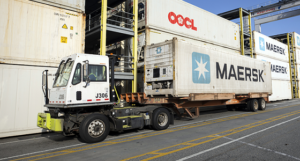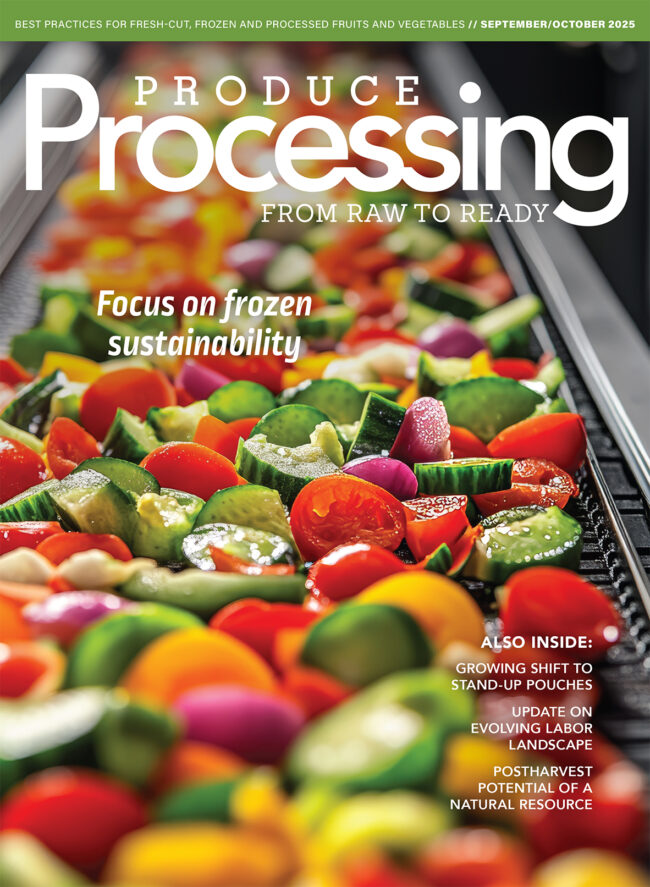Produce imports fueling record growth at Southeast port
Produce is a driving factor behind the Port of Savannah’s skyrocketing growth, which includes more than $40 million invested in infrastructure to support refrigerated cargo.
In 2024, port volumes increased by 12.5%, making the Georgia hub the fastest-growing container port on the U.S. East and Gulf coasts. Produce accounted for 16,900 loaded 20-foot equivalent container units (TEUs) of the approximately 4 million loaded TEUs handled by the port last year, with 16,109 of those carrying imported produce.
That growth shows no signs of slowing in 2025. The Port of Savannah’s container trade increased by 22.5% in the busiest March on record, with 98,000 more TEUs handled compared to March 2024. In intermodal cargo, the port set an all-time record of 52,645 containers moved by rail, an increase of 17% over the same month last year.
“This strong performance is a testament to the trust our customers place in the Port of Savannah as their gateway to the U.S. Southeast,” Griff Lynch, Georgia Ports Authority (GPA) president and CEO, said in a news release.
Georgia Ports has invested $42.5 million dollars on infrastructure to support refrigerated cargo, according to Edward Fulford, GPA manager of media relations. Produce makes up a crucial component of that cargo.
“The Authority recognizes produce as a market segment it can continue to grow through continued world-class service,” Fulford said.
REFRIGERATED FOCUS
The produce moving through the port is most often imports supplementing out-of-season domestic commodities as well as products not grown in the U.S., such as bananas.
“Grapes, citrus and onions continue to be the main drivers through Savannah, but we also import kiwis, avocados, mangos, bananas, etc.,” Fulford said. “We are not exporting any substantial volumes of produce in Savannah.”
Produce movement is year-round at the Port of Savannah, Fulford said.

“We are in the Chilean grape season now, with the Peruvian grape season coming to an end,” he said in an April 14 email. “GPA is gearing up for citrus season particularly out of Peru, Chile and South Africa.”
Keeping the imported produce cold is a key factor in the port’s operations. In 2023, GPA added seven new refrigerated container racks, for a total of 126. With nearly 3,500 container plug-ins (3,024 on racks, 221 on chassis and 240 grounded yard slots), the Port of Savannah has ample capacity to serve both import and export refrigerated cargo, Fulford said.
For improved resilience, GPA has connected 40 of its refrigerated container racks to a dedicated power substation at the port’s Garden City Terminal and plans to connect the other 86.
“Velocity through the terminal is a key driver to success, so GPA remains engaged with all parties involved to process these commodities as quickly as possible,” Fulford said.
In 2024, the Port of Savannah handled more than 73,000 TEUs of refrigerated imports, including a mix of perishable cargo/produce, frozen seafood, frozen meat, frozen vegetables and pharmaceuticals.

REGIONAL ATTRACTION
Further fueling the port’s growth is an ecosystem of nearby cold storage warehousing, including Lineage Logistics, Americold and Georgia Fresh Pack. Medlog is the newest area addition, with plans to open a new refrigerated warehouse in Rincon, Georgia, this summer.
Lineage invested $62 million in its Savannah Fresh-Port Wentworth facility, which opened in April 2023 in Port Wentworth. The facility, which also provides fumigation, packaging and other value-added services for customers, was a key cog in the port’s plans to increase its private chilled and frozen warehouse space by 11% in 2023 to more than 2.2 million square feet.
The Savannah region attracts such investment for several reasons, Fulford said.
“The Port of Savannah provides an alternative to congested points of entry at other ports, especially for those customers serving the U.S. Southeast market,” he said. “As the region with the fastest-growing population in the U.S., increasing consumer demand is driving growth in fresh produce imports through Georgia.”
On-terminal rail services and direct interstate connections provide easy access to major markets including Atlanta, Charlotte, Nashville and Orlando, as well as destinations across Texas, Fulford said.
Terminal inspection services are also increasing, with U.S. Customs and Border Protection doubling its presence from 150,000 square feet to 300,000 in a newly remodeled building which will include 20 plug-ins on the exterior walls for reefer containers on chassis, as well as 4,000 square feet of refrigerated space for customers interested in on-terminal inspections.
EXPANSIVE IMPACT
The growth of ports in both Savannah and Brunswick, which added Swiss shipper Sallaum Lines in early April, has a statewide economic impact. One in eight jobs across Georgia is related to the ports, according to a study by the Selig Center for Economic Growth at the University of Georgia’s Terry College of Business.
Georgia ports now help sustain 12% of total state employment, based on fiscal year 2023 figures. The number of Georgia jobs that rely on port activity grew by 8.5% since the previous study, based on FY2021 data.
“On behalf of the Georgia Ports Authority, I would like to thank our employees, Gateway Terminals, the local International Longshoremen’s Association, and the railroads, shipping lines and motor carriers who are our frontline partners in logistics, serving our customers,” Kent Fountain, GPA board chair, said in a news release.
“In Georgia, we are united in our commitment to serving the farms, factories and businesses that support the economy of our state and nation.”










